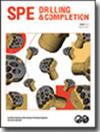Investigation of Dehydroxylated Sodium Bentonite as a Pozzolanic Extender in Oil-Well Cement
IF 1.2
4区 工程技术
Q3 ENGINEERING, PETROLEUM
引用次数: 2
Abstract
Fly ash, which is a pozzolan generated as a byproduct from coal-powered plants, is the most used extender in the design of lightweight cement. However, the coal-powered plants are phasing out due to global-warming concerns. There is the need to investigate other materials as substitutes to fly ash. Bentonite is a natural pozzolanic material that is abundant in nature. This pozzolanic property is enhanced upon heat treatment; however, this material has never been explored in oil-well cementing in such form. This study compares the performance of 13-ppg heated (dehydroxylated) sodium bentonite and fly-ash cement systems. The raw (commercial) sodium bentonite was dehydroxylated at 1,526°F for 3 hours. Cement slurries were prepared at 13 ppg using the heated sodium bentonite as partial replacements of cement in concentrations of 10 to 50% by weight of blend. Various tests were done at a bottomhole static temperature of 120°F, bottomhole circulating temperature of 110°F, and pressure of 1,000 psi or atmospheric pressure. All the dehydroxylated sodium bentonite systems exhibited high stability, thickening times in the range of 3 to 5 hours, and a minimum 24-hour compressive strength of 600 psi. At a concentration of 40 and 50%, the 24-hour compressive strength was approximately 800 and 787 psi, respectively. This was higher than a 13-ppg fly-ash-based cement designed at 40% cement replacement (580 psi).脱氢钠膨润土作为油井水泥中火山灰填充剂的研究
粉煤灰是燃煤电厂产生的副产品,是轻质水泥设计中使用最多的填充剂。然而,由于对全球变暖的担忧,燃煤电厂正在逐步淘汰。有必要研究其他材料作为粉煤灰的替代品。膨润土是自然界中储量丰富的天然火山灰材料。这种火山灰性质在热处理后得到增强;然而,这种材料从未以这种形式应用于油井固井。本研究比较了13ppg加热(去羟基化)钠膨润土和粉煤灰水泥体系的性能。原料(商品)钠膨润土在1526°F下脱氢3小时。在13 ppg的条件下,使用加热的钠基膨润土作为水泥的部分替代品,以10 - 50%的混合质量浓度制备水泥浆。在井底静态温度为120°F、井底循环温度为110°F、压力为1,000 psi或大气压的条件下进行了各种测试。所有脱羟化钠膨润土体系均表现出高稳定性,增稠时间在3至5小时之间,最小24小时抗压强度为600 psi。在浓度为40%和50%时,24小时抗压强度分别约为800和787 psi。这比在40%水泥替换量(580 psi)下设计的13 ppg粉煤灰基水泥要高。
本文章由计算机程序翻译,如有差异,请以英文原文为准。
求助全文
约1分钟内获得全文
求助全文
来源期刊

SPE Drilling & Completion
工程技术-工程:石油
CiteScore
4.20
自引率
7.10%
发文量
29
审稿时长
6-12 weeks
期刊介绍:
Covers horizontal and directional drilling, drilling fluids, bit technology, sand control, perforating, cementing, well control, completions and drilling operations.
 求助内容:
求助内容: 应助结果提醒方式:
应助结果提醒方式:


